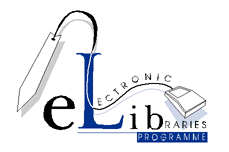CINE: Cartoon Images for Network Education
- Project web site
-
http://www.kcl.ac.uk/projects/cine/
- Programme area
-
Training and Awareness
- Contact details
-
Dr Frances Blomeley, Senior Applications Analyst/Advisor,
Kings College The Strand London WC2R 2LS
Phone: 0171 873 2817
Email: f.blomeley@kcl.ac.uk
Project description
as of 24th July 1996
Introduction
Desktop network access has given independence to a new generation of information users, though training and explanation for effective use of networked resources remain essential. Many wait on the moment of failure or incomprehension before they ask for assistance. Many spurn workshops provided. And there is a marked reluctance by others to read guides in either hard copy or electronic form. Even then, wholly verbal explanations of unfamiliar concepts may bypass understanding. The CINE project will explore the potential of visual and animated media as a supplement or as an alternative to text.Animation as a medium provides three major benefits, and we expect to exploit them fully:
- movement to hold the attention of the viewer
- movement to illustrate the flow of information
- graphical images to represent concepts by analogy
Description
The approach will consist of short (2-5 minutes) animated sequences, designed to answer very general "how does it work?" questions. These animations are intended to be entertaining, concise, and informative about fairly broad concepts. They would use both conventional 'cartoon' character animation as well as more schematic displays showing data lookups, transformations, and the way processes are managed across networks.Three animation modules will be produced during the course of the project. The topics selected are:
- Text searching techniques
- The World Wide Web
- Z39.50 operation
The basic methods for indexing and searching text have remained fairly standard despite superficial differences between services. This module will explain how text is indexed and how searching is performed, including methods of refining searches and recent adaptations. It will show why some operations, which may seem natural to the inexperienced user, are not possible.
The World-Wide-Web
Although graphical browsers make access to the web simple, many users remain confused when confronted with failures to connect, or requests for uninstalled helper applications. This module will overview Web operations, to explain those components which cause misunderstandings and errors, URLs, clients and servers, and linked systems.
Z39.50 operation
With the experience gained by the project team since the production of a pilot demonstration animation, there will be a new version of the Z39.50 theme. This will show what it is, why it is a good thing, and how it works. This module will also show the different components necessary for Z39.50 implementation, including a demonstration of a WWW-Z39.50 gateway.
Delivery
Each module will be available in several formats, e.g.- via the World-Wide-Web, using standard graphic features (animated GIFs, Java) 'plug-ins' (Shockwave) or an associated viewer, to be available on all system platforms
- URLs and small graphics for embedding in local and national services, for retrieval at the point of need
- PowerPoint presentation, with associated text and graphics
- free-standing animations to include in other presentations
- zip/compressed for fast transmission from the file server
Each module will be promoted via appropriate mailing lists and newsletters. The animations will be backed up with a range of more conventional, and more detailed, on-line documentation. A coloured handout will describe each as it is released, and these will cumulate throughout the project. Copies of this promotional material will be available for local reprinting from http://www.kcl.ac.uk/projects/cine/
One presentation will be made for each module produced, and offered to appropriate venues, e.g. the JANET User Support Workshop.

